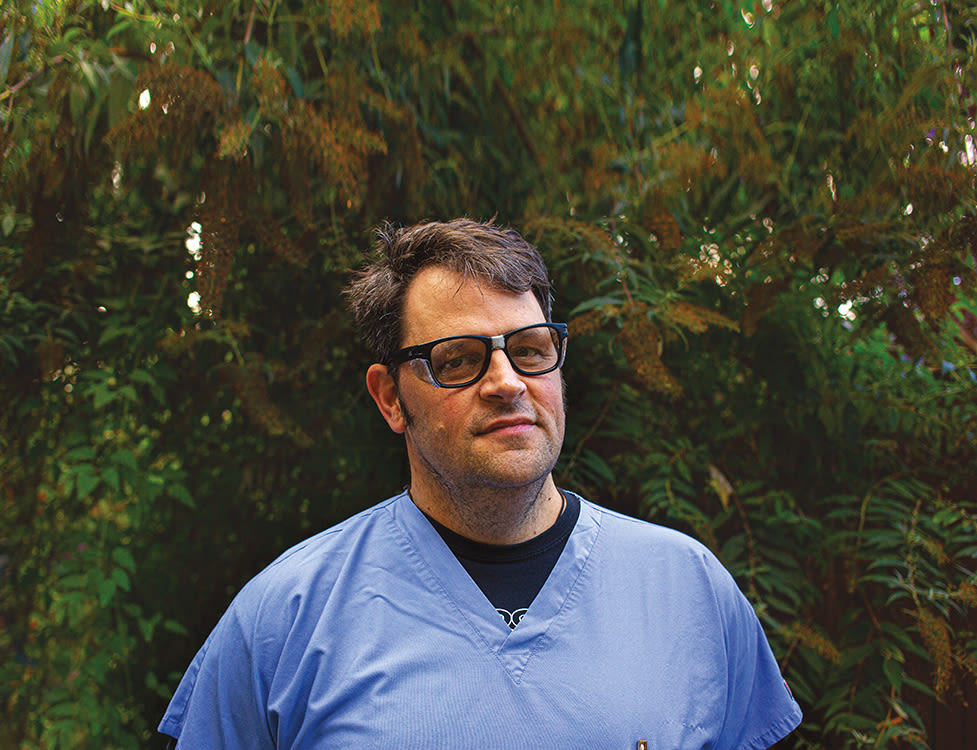A Voice from the COVID Trenches

Image: Michael Novak
Andy Paulson got into nursing at age 32, inspired by the care his wife received after being hit by a car. Now 50, the Southeast Portlander thought he’d seen it all, until COVID came for his unit at OHSU. After 20 roller-coaster, uncertain months, Paulson, like most other health care workers, is exhausted, apprehensive, and more than a little fed up. But he’s resolved to keep going, not anywhere close to giving up on a career that’s shaped his life. Earlier this fall, he told Portland Monthly about what life’s been like in the COVID trenches for those who’ve stayed to fight another day.
On the before-delta times: “Early on, like April, downtown was just suddenly empty. Nobody was on the bus for a long time. It was just me and the bus driver. Nobody wanted anything to do with our family because I was up there [at the hospital], and we didn’t really want anything to do with anybody else either because we didn’t know what was going to happen. We pulled our first grader out of school a week before they shut down. I just felt like COVID was crawling all over me all the time....
“[In 2020] we never really got clobbered. It was almost like it wasn’t real. And then everybody’s like ‘Hey, you’re doing an awesome job!’ And the nursing memes were hilarious. We got the vaccine around Christmastime. I really thought that we had made it. I didn’t know anybody who wasn’t gonna get the vaccine. It didn’t get really real for me until, frankly, July 1 [when the indoor mask mandate was briefly lifted in Oregon].”
By August 2021, Paulson’s workplace was on red alert. “The messaging we were getting is that all transfers and orientations were canceled. And if you didn’t take vacation, and didn’t call in sick through the end of September, you’d get a $5,000 bonus. And surgeries were canceled again. I’ve never seen anything like it. All these managers were, like, haunted in a way that they hadn’t looked since before [COVID] came on, like they knew something.”
As the months wore on, the hospital got flooded with unvaccinated patients, many from outside of the metro area. “They’re a difficult group to sympathize with. And, you know, we’re all pretty tired. One way to look at it is we’re finally getting the pandemic that we’ve been promised. We’re short staffed, we’re tired, people are really sick. The ICU is full. We can’t send people to the ICU that need it. People are waiting five days to get in for something that they normally wouldn’t have had to wait for....
“There was a lady two weeks ago. She died of COVID. And like, we just couldn’t help her. There was nothing that we could do. And we had the oxygen turned all the way up. And the [certified nursing assistant] is like, ‘Andy, what are we going to do?’ and I’m like, ‘We just have to sit here and watch this.’ She didn’t want to be intubated. She should have been in the ICU, but the ICU is full. So, she just stays. We listened to [the oxygen monitor] alarm until it wasn’t alarming anymore. And, you know, she was dead. And just to watch that slow burn—we’re not used to that. And that causes more than fatigue, almost like some trauma.”
On why he stays in nursing: “I do feel honored that I get to work there. The work is important. And every single day it’s just different enough. Like, I do the same stuff. I pass meds and I do this and that, but really, everybody comes from a super-unique place, and I’m just trying to get them back to that place so that they can keep doing what they were doing before. It doesn’t even feel like a job. It just feels like a place where I get to go help. There’s lots of disgusting things, but it’s not spiritually and morally disgusting and that is why I probably won’t ever leave because it’s good. It’s good work.”




